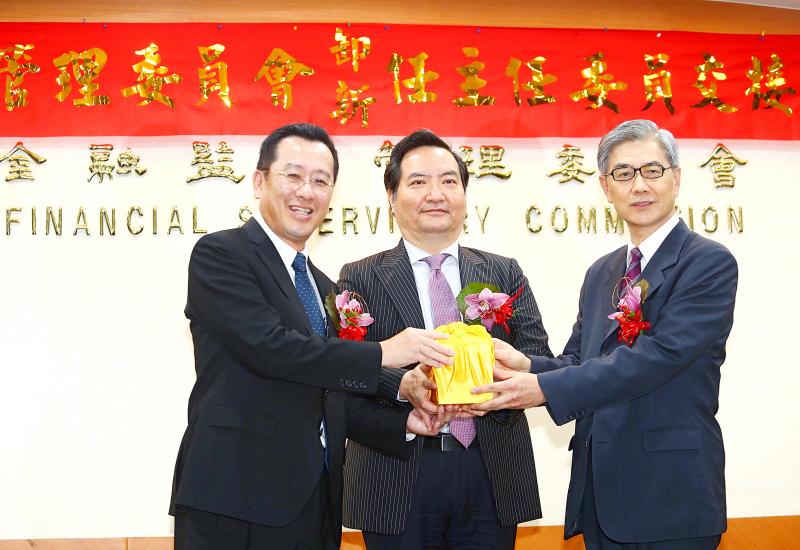Financial Supervisory Commission (FSC) Chairman Thomas Huang (黃天牧) yesterday said that after taking office, he would concentrate on monitoring financial companies’ capital adequacy and promoting financial technology, sustainable finance and inclusive financing.
Huang told a handover ceremony in New Taipei City that he would make sure that companies have a sufficient capital adequacy ratio and exercise comprehensive risk management, as he expects financial conglomerates to be resilient enough to weather market volatility.
As the global economy undergoes digital transformation, the commission would continue encouraging firms to develop financial technology to boost their competitiveness, he said.

Photo: CNA
The agency would also monitor possible risks related to innovative businesses, he added.
The commission would promote green finance — providing funds or financial tools such as bonds to borrowers for sustainable or green investments — as financial companies should fulfill their social responsibility and create “win-win” situations for the economy and the environment, Huang said.
It would also focus on inclusive finance, asking companies to provide diverse products and services to meet the needs of various enterprises and individuals, he said.
The commission would keep its regulations in line with international rules, Huang said, adding that if it introduces new international standards in the nation, it would adopt a phased approach and impose fines conforming to the principle of proportionality.
“Financial supervision and regulation is my life’s work and vocation,” the 61-year-old said. “Supervision should be independent, fair and just.”
Huang said that he has adopted the motto of Chang Chi-luan (張季鸞) — former chief executive editor of the Chinese-language Ta Kung Pao (大公報) — “no party affiliation, no political endorsement, no self-promotion, no ignorance,” (不黨,不賣,不私,不盲) as his own.
All regulations and policies should prioritize the nation’s interests, he said.
Huang also urged banks to be more proactive about approving loans to businesses affected by the COVID-19 pandemic to help the nation’s economy recover.
Former FSC chairman Wellington Koo (顧立雄), who recommended Huang to Premier Su Tseng-chang (蘇貞昌) as his successor, said that Huang would be a professional supervisor, as he has experience and integrity.
Huang, who was the commission’s vice chairman since 2013, served as the head of the agency’s Insurance Bureau; the Securities and Futures Bureau; and the Examination Bureau.

SELL-OFF: Investors expect tariff-driven volatility as the local boarse reopens today, while analysts say government support and solid fundamentals would steady sentiment Local investors are bracing for a sharp market downturn today as the nation’s financial markets resume trading following a two-day closure for national holidays before the weekend, with sentiment rattled by US President Donald Trump’s sweeping tariff announcement. Trump’s unveiling of new “reciprocal tariffs” on Wednesday triggered a sell-off in global markets, with the FTSE Taiwan Index Futures — a benchmark for Taiwanese equities traded in Singapore — tumbling 9.2 percent over the past two sessions. Meanwhile, the American depositary receipts (ADRs) of Taiwan Semiconductor Manufacturing Co (TSMC, 台積電), the most heavily weighted stock on the TAIEX, plunged 13.8 percent in

A wave of stop-loss selling and panic selling hit Taiwan's stock market at its opening today, with the weighted index plunging 2,086 points — a drop of more than 9.7 percent — marking the largest intraday point and percentage loss on record. The index bottomed out at 19,212.02, while futures were locked limit-down, with more than 1,000 stocks hitting their daily drop limit. Three heavyweight stocks — Taiwan Semiconductor Manufacturing Co (TSMC, 台積電), Hon Hai Precision Industry Co (Foxconn, 鴻海精密) and MediaTek (聯發科) — hit their limit-down prices as soon as the market opened, falling to NT$848 (US$25.54), NT$138.5 and NT$1,295 respectively. TSMC's

TARIFFS: The global ‘panic atmosphere remains strong,’ and foreign investors have continued to sell their holdings since the start of the year, the Ministry of Finance said The government yesterday authorized the activation of its NT$500 billion (US$15.15 billion) National Stabilization Fund (NSF) to prop up the local stock market after two days of sharp falls in reaction to US President Donald Trump’s new import tariffs. The Ministry of Finance said in a statement after the market close that the steering committee of the fund had been given the go-ahead to intervene in the market to bolster Taiwanese shares in a time of crisis. The fund has been authorized to use its assets “to carry out market stabilization tasks as appropriate to maintain the stability of Taiwan’s

STEEP DECLINE: Yesterday’s drop was the third-steepest in its history, the steepest being Monday’s drop in the wake of the tariff announcement on Wednesday last week Taiwanese stocks continued their heavy sell-off yesterday, as concerns over US tariffs and unwinding of leveraged bets weighed on the market. The benchmark TAIEX plunged 1,068.19 points, or 5.79 percent, to 17,391.76, notching the biggest drop among Asian peers as it hit a 15-month low. The decline came even after the government on late Tuesday authorized the NT$500 billion (US$15.2 billion) National Stabilization Fund (國安基金) to step in to buoy the market amid investors’ worries over tariffs imposed by US President Donald Trump. Yesterday’s decline was the third-steepest in its history, trailing only the declines of 2,065.87 points on Monday and